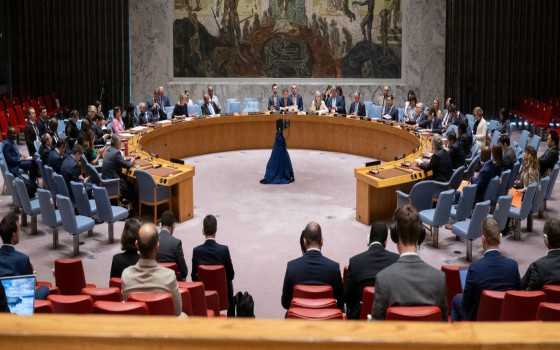
Syria: UN affirms importance of fundamental reform in political transition following Sweida events. Those involved in the events and the fragile truce hold.

- Europe and Arabs
- Tuesday , 29 July 2025 7:58 AM GMT
New York - Damascus: Europe and the Arabs
The UN Special Envoy for Syria, Geir Pedersen, stressed the urgent need for fundamental reforms to the security and political transition process in Syria following the violence in Sweida Governorate last month, which resulted in "massive casualties, depleted trust, and increased risks of fragmentation." According to the UN Daily News Bulletin on Tuesday morning, the UN Envoy stressed, during his address to the Security Council meeting on the situation in Syria on Monday, that the horrific violence endured by Syrians in Sweida should not have occurred and "also witnessed unacceptable foreign interference."
He explained that he and his deputy, Najat Rochdi, have been in contact with the authorities in Damascus and local actors in Sweida throughout this period.
UN Condemnation of Violations
Speaking via videoconference, Geir Pedersen condemned the horrific violations against civilians and fighters in Sweida. He also condemned the Israeli intervention and dangerous airstrikes in Sweida and Damascus.
He expressed deep concern about credible reports received by the UN Human Rights Office and his office, indicating widespread violations and abuses, including summary executions, arbitrary killings, abductions, destruction of private property, and looting of homes.
He said that the reported perpetrators included members of the security forces and state-affiliated individuals, as well as other armed elements from the area, including Druze and Bedouins.
Fragile truce still holds
The UN official pointed to the truce declared on July 19, under which Bedouin forces withdrew from most of Sweida, security forces redeployed to the governorate's outskirts, clashes subsided, and Israeli airstrikes ceased, although sporadic skirmishes continued.
He warned that while the fragile truce largely held, "the situation remains tense and volatile."
Geir Pedersen reported that approximately 175,000 people had been displaced, noting that humanitarian needs were acute. He stressed the need for the United Nations to be able to deliver humanitarian aid continuously and without hindrance. He noted some exchanges of civilians and fighters who had been detained.
A Need for Wisdom and Flexibility
The Special Envoy said that confidence in lasting security depends above all on the credibility of the political transition itself, noting that "loyalty to the state cannot be imposed by force. Rather, it must be earned through a genuine process that builds a representative state, protects the rights of all, and is inclusive of all segments of society on an equal footing."
He continued, "This is the time for flexibility and wisdom above all. If key components and communities see the state not as a state but as a threat, attitudes harden. Likewise, if the leadership of these components and communities sees it stalling or opposing genuine integration into a single state structure, attitudes harden in the other direction as well."
Pederson said that this fundamental challenge requires genuine dialogue and compromise, and active third-party assistance to support a Syrian-led and Syrian-owned, inclusive political transition that restores Syria's sovereignty and unity and empowers all Syrians to shape the country's future. He affirmed the UN's readiness to do its utmost to help, working with the authorities and all Syrians. He concluded by saying, "Simply put, the Syrian political transition cannot fail."
Major Damage to Infrastructure
Edem Wesorno, Director of Operations and Advocacy at the UN Office for the Coordination of Humanitarian Affairs, said that women, children, and medical personnel were among the hundreds of people reported killed. She noted that the World Health Organization had confirmed reports of two doctors being killed, ambulances being obstructed and targeted, and hospitals being temporarily occupied.
She reported extensive damage to the water infrastructure, disrupting water supplies. Major power outages were also reported, along with serious disruptions to food, fuel, and other supplies in markets.
She explained that the main hospital was severely overstretched, with a severe shortage of medical supplies and staff, and a lack of electricity.
The UN official stressed the need to protect those trapped in the fighting and allow them to move freely in search of safety and medical treatment. She also emphasized the importance of protecting infrastructure and essential services—including healthcare, water, sanitation, and electricity. The UN is engaged with all parties
Edem and Sorno said that the Office for the Coordination of Humanitarian Affairs (OCHA) is engaged with all parties to ensure the rapid delivery of aid, but she said that access remains restricted.
She stated that a convoy of 32 trucks from the Syrian Arab Red Crescent arrived in Sweida on July 20, carrying aid provided by the World Food Programme and UNICEF, as well as other partners.
On July 23, a second Syrian Arab Red Crescent convoy arrived in Sweida carrying food, wheat flour, fuel, medicines, and health supplies—including aid provided by the UN—today.
The UN official also reported that a third similar convoy arrived in Sweida on Monday, containing fuel for hospitals and bakeries, food, surgical kits, and shelter supplies.
She said that the UN continues to engage with partners and the interim authorities to obtain direct access to Sweida as soon as security conditions permit. She urged all parties to facilitate expanded and sustained access for humanitarian aid and personnel, including medical personnel. Edem and Sorno explained that the United Nations is working with the Syrian Arab Red Crescent and NGO partners to provide food, nutrition, health services, water, protection services and other vital supplies to the newly displaced in reception centres in neighbouring Daraa and in rural Damascus.












No Comments Found